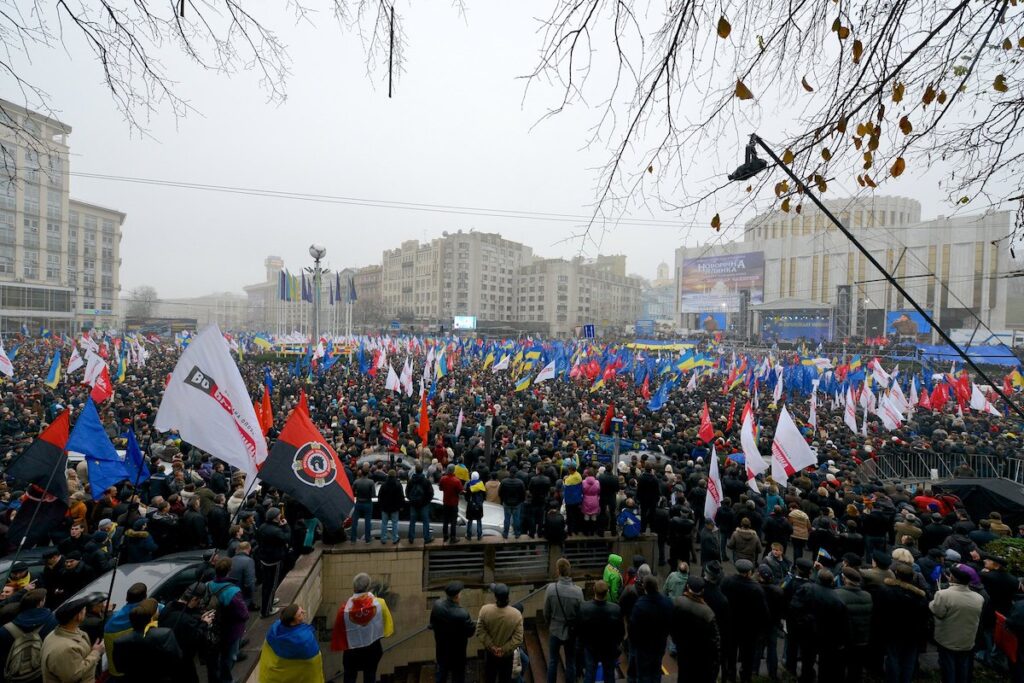After nearly two weeks of violent conflict in Ukraine, it is increasingly difficult to stand back and see the bigger picture. The West has lined up behind the charismatic President Zelensky, who has addressed parliaments in Brussels and Westminster to rapturous applause. In Britain, football stadia and Oxbridge colleges (including my own) have draped themselves in the Ukrainian national colours. There is little or no attempt to representation of the Russian perspective. It is light versus darkness, innocent victims versus post-communist megalomaniacs, Europe versus Oriental Despotism. In her recent contribution to this blog, Elizabeth Cullen Dunn presents the binary in terms of the right of smaller peoples to choose freedom in the face of Russian neo-imperialism.
The evidence seems so clear cut that only a Putin stooge or an idiot could argue differently. But anthropologists have a habit of complicating matters and they are not alone in doing so. You don’t have to be a Marxist to highlight the humiliation heaped upon Russia by Western leaders unable to discard their Cold War blinkers; but David Harvey addresses this emotional dimension particularly well. The West bears a lot of responsibility for creating the monster called Putin: it rebuffed Russian efforts to integrate into western institutions, instead targeting their closest relations for admission to the world’s most militarily powerful and economically prosperous alliances (Kalb 2022). Elsewhere, Michael Hudson has pinpointed the American interests that lie behind spectacular demonstrations of renewed Western unity; the catastrophe in distant Ukraine is already a defeat for Europe, and especially Germany, by the military-industrial complex of the capitalist hegemon, in combination with the key sectors of resource extraction and finance.

Few of the analyses I have read so far engage with the history and geography of the places where the violence is unfolding. I suspect most Western Europeans and North Americans perceive Ukraine naively as the historic homeland of the Ukrainian people, regrettably complicated by a subversive Russian minority. In fact, the territory of contemporary Ukraine has been occupied by many diverse populations since prehistoric times (Magocsi 2010 provides a dispassionate and comprehensive history). The dominant elements in the last millennium have been Slavic. Kyiv was the centre of the first Rus’ polity. The city was conquered by the Mongols in 1240 and was not reintegrated into a Slavic state until centuries later. A Ukrainian national consciousness emerged only in the late Tsarist era. When the great empires of the region collapsed at the end of the First World War, the majority of former subjects hardly knew what their identity was (or should become) as citizens of a nation-state. In the case of Ukraine, this learning process has dragged out over a century. It is being completed before our eyes in the most tragic way imaginable.
This particular history needs to be born in mind constantly when commentators write about “the Ukrainian people” as an entity of great antiquity. It goes without saying that the writers of history books in today’s post-Soviet Ukraine can evoke national heroes who repelled invaders in the distant past. This is in fact easier terrain than the twentieth century. Elizabeth Dunn is right to note that the Ukrainian Soviet Socialist Republic was a product of forcible incorporation into a new empire, that of the USSR. She does not describe the chaotic and violent circumstances in which very different Ukrainian polities were constructed on the ground in 1918-9, when the national flag was already the flag in use today. She does not mention the large-scale pogroms that characterized the larger of these embryonic Ukrainian states. The dark history of repressed Ukrainian nationalism continued during and after the Second World War (see also Kalb 2022), when most of its leaders collaborated with Nazi occupying forces and instigated new campaigns of terror against Poles as well as Jews. Dunn cites the result of the referendum of 1991 as evidence that the overwhelming majority of Ukrainian citizens wished to regain their sovereignty. She does not detail the circumstances in which this referendum was held, following an attempted coup in Moscow, when the socialist empire had already imploded. Earlier in that same year (despite a national revival in the years of perestroika), a large majority of Ukrainian citizens voted not for independence but for a continuation of the Soviet Union in some form.
It is easy to get lost in such details and anthropological case-studies are unlikely to help. We need tools for comparative analysis at the macro level. In an original comparison of the demise of the Habsburg and Ottoman empires, Andre Gingrich (2002) proposed the concept of “dethroned majorities” to help grasp the virulence of national sentiment both inside and outside the boundaries of the shrivelled states that emerged from imperial collapse. It is instructive to consider contemporary Ukraine in this light, where the “dethroning” was interrupted for almost a century by socialist federalism. In this post-imperial conjuncture, the familiar range of ressentiments at the former imperial centre has been intensified by the broken promises of the West. Simultaneously, emotions also run high among those motivated by a mission to consolidate a new nation-state on exclusivist principles, with a particular distaste for co-citizens suspected by virtue of their nationality of identifying with the ancien régime.
Structurally, the comparative analysis of socialist empires should be extended to China. While copying many aspects of Soviet nationalities policy, Mao was careful to maintain continuity with the Qing dynasty: thus even “autonomous” regions such as Tibet and Xinjiang were integral components of the sovereign nation-state. Although few Cold War scholars in the West took Soviet federalism seriously, without this “decorative fiction” the constituent republics would not have been able to proclaim their independence as they did, hastening the final disintegration of the USSR.
Does each sovereign state have the right to seek out new partners freely and without restriction? International law guarantees this, but again it is worth considering real-life comparisons. Elizabeth Dunn invokes Canada and Mexico hypothetically, but the case of Cuba seems more pertinent. When the Soviet Union (responding to Western initiatives in Eurasia) sought to place missiles on the territory of its ally in 1962, President Kennedy triumphed in the ensuing diplomacy. So much for sovereignty. If we are to avoid double standards, it is incumbent on us in the West to see the expansion of NATO through Russian eyes, i.e. as aggression.
The Russian Federation has swallowed the admission to the Western military alliance of several former allies and even the Baltic states that were formerly inside the empire. But it has always stressed that Ukraine was different. Vladimir Putin’s rhetoric concerning Ukraine is open to the same objections as that of his neo-nationalist opponents: essentialist notions of the Eastern Slavs as one people eternally are no more convincing than Adolf Hitler’s justifications for the Anschluss of Austria. So Dunn is right: Ukrainian citizens should have the right to opt for new allegiances. Some observers may object that they have not done so freely, that the CIA played a key role in the Maidan demonstrations that toppled an elected government. The circumstances were tarnished. Yet it is reasonable to assume that the “European” course would in any case have triumphed eventually. With millions of Ukrainians already working in the West as labour migrants, the material incentives to benefit from consolidating this affiliation were overwhelming.
At the supra-national level, the European Union must be similarly free to decide who is eligible for “priority partner” status and who is to be left out in the cold. But those who formulate and justify these policies in the name of “democracy promotion” have elementary obligations to reckon with the consequences of their implementation. The combination of geopolitical security considerations and intimate historical connections make for a complex configuration in which it was irresponsible of the West to forge ahead in transforming Ukraine into a neoliberal “vassal state” (Kalb 2022) while isolating Russia.
Almost thirty years have passed since Samuel Huntington put forward his own distinctive vision of how cultural factors would come to dominate geopolitics in the wake of the Cold War (Huntington 1996). The conservative political scientist, though hardly an expert on East-Central Europe, paid considerable attention to Ukraine. He saw the country as divided by a “fault line” between east and west. In the west, Galicians had been free to nurture national sentiment under the Habsburgs, while the Greek-Catholic Church had introduced elements of pluralism characteristic of the West. No such pluralism was tolerated in the Russian-controlled territories, which according to Huntington belonged to a distinct civilization. This binary makes anthropologists uncomfortable but it is not entirely fabricated. East-west differences have been clearly visible in Ukrainian voting patterns since the 1990s, as the country oscillated between pro-Russian and pro-Western governments. Nationalist sentiment has always been strongest in western cities such as Lviv. This is not the sort of nationalism that commends itself to liberals in Brussels. In practice it has meant, for example, significant constraints on the evolved rights of Hungarian and Rusyn minorities in Transcarpathia.
Might any positives emerge from this tragedy? It is hard to be optimistic. Persistent nationalist blemishes in Ukraine might be excused in light of the post-imperial conjuncture, and corrected once the country is inside the European Union (though the examples of neighbouring Hungary and Poland are not encouraging in this regard). Another pious hope would be that the corruption riddling Ukraine’s post-Soviet kleptocracy (until now so similar to that of Russia) might be more effectively addressed following accession.
In any case, rapid accession is surely inevitable. When the “dethroned majority” resorts to such brutal action, Huntingtonian fault lines will finally be transcended. Ukraine will not have to oscillate any longer. Having paid a ghastly price in blood, it will be welcomed as a worthy member of the Euro-American civilization, thereby taking its long history of imperial peripherality to a new level. Fast-track admission may also be offered to Moldova and Georgia. NATO membership will perhaps have to be postponed for all three, but only for as long as Western Europe remains highly dependent on Russian gas and oil.
It is hard to see any grounds for optimism at all concerning Russia. The Kremlin will dig in and continue to behave badly in fogs of nationalism. Putin and his eventual successors will emphatically deserve to remain in that category of “other” (for the free West), with all glimmers of a post-Soviet escape route extinguished. Russia will continue to occupy that slot at least until an alternative “other” has taken shape (perhaps the socialist empire that rejected the federal model?).
Meanwhile the immediate winners of this catastrophe are Washington, numerous large American corporations, and generally the manufacturers of weapons and flags.
Chris Hann is Emeritus Director of the Max Planck Institute for Social Anthropology and a Fellow of Corpus Christi College, Cambridge.
References
Gingrich, Andre 2002. “When ethnic majorities are ‘dethroned’: towards a methodology of self-reflexive, controlled macrocomparison” in Andre Gingrich and Richard G. Fox eds. Anthropology, By Comparison. London: Routledge. pp. 225-48.
Hudson, Michael. 2022. “America defeats Germany for the third time in a century.” Monthly Review online blog, 28th February: https://mronline.org/2022/02/28/america-defeats-germany-for-the-third-time-in-a-century/
Huntington, Samuel P. 1996. The Clash of Civilizations and the Remaking of World Order. New York: Simon and Schuster.
Kalb, Don. 2022. “‘Fuck Off’ versus ‘Humiliation’: The Perverse Logic towards War in Europe’s East.” FocaalBlog, 1 March. https://www.focaalblog.com/2022/03/01/don-kalb-fuck-off-versus-humiliation-the-perverse-logic-towards-war-in-europes-east/
Magocsi, Paul Robert. 2010. A History of Ukraine. The Land and Its Peoples. (Second Edition) Toronto: University of Toronto Press.
Cite as: Hann, Chris. 2022. “The Agony of Ukraine.” FocaalBlog, 11 March. https://www.focaalblog.com/2022/03/11/chris-hann-the-agony-of-ukraine/
